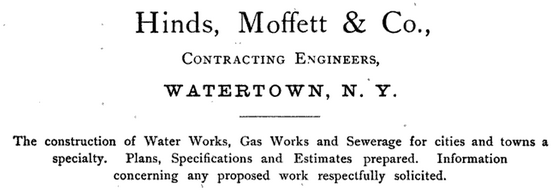
by John James Robertson Croes (1885) Page 40.
| Introduction | Historical Background | Chronology | Geography | Biography | Technology | Ownership and Financing | General Bibliography |
| Ownership and
Financing of American Water Works |
Moffett, Hodgkins & Clarke |
In January, 1883, Frank A. Hinds reorganized his engineering, F. A. Hinds & Co., by adding John F. Moffett, H.C. Hodgkins and J.V. Clark in the new firm of Hinds, Moffett & Co. Hinds and Moffett had both been commissioners for the Watertown municipal water works. This company designed and built several water systems, and owned some number of them.
 |
| Statistical
Tables from the History and Statistics of American Water Works by John James Robertson Croes (1885) Page 40. |
Frank Hinds left the partnership in April, 1886 due to poor health and the firm was renamed Moffett, Hodgkins & Clarke. The new firm assumed the existing contracts and built more than 65 water systems between 1884 and 1893. The partners incorporated the company in New Jersey in 1891, as that state was the first that allowed incorporated companies to own stock in other companies. The American Pipe Manufacturing Company and the American Water Works and Guarantee Company had also incorporated in New Jersey to become holding companies..
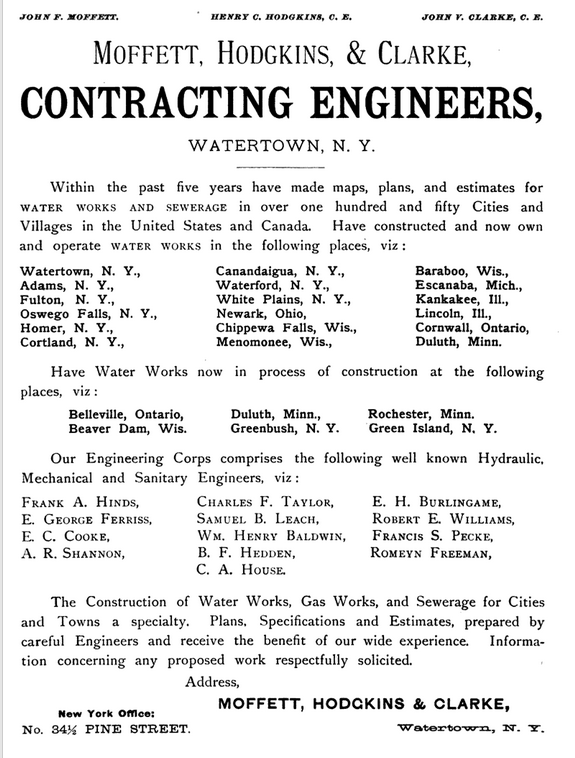 |
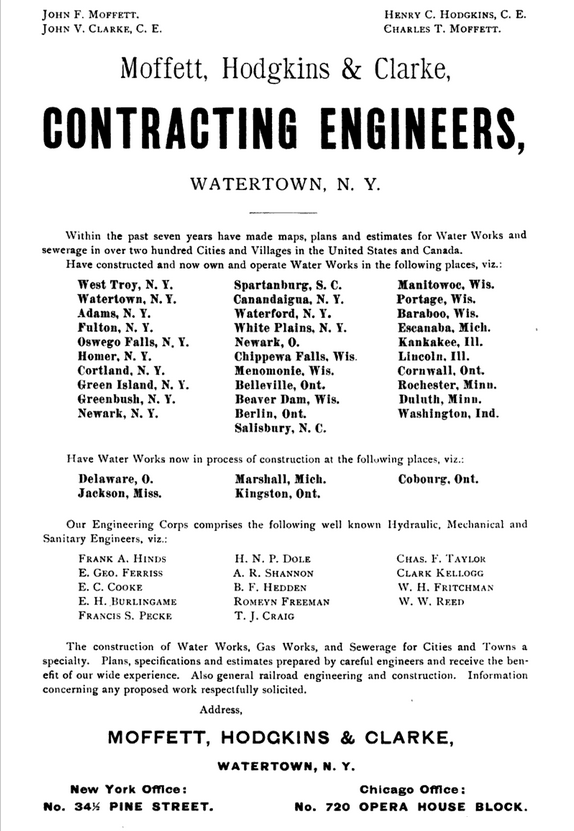 |
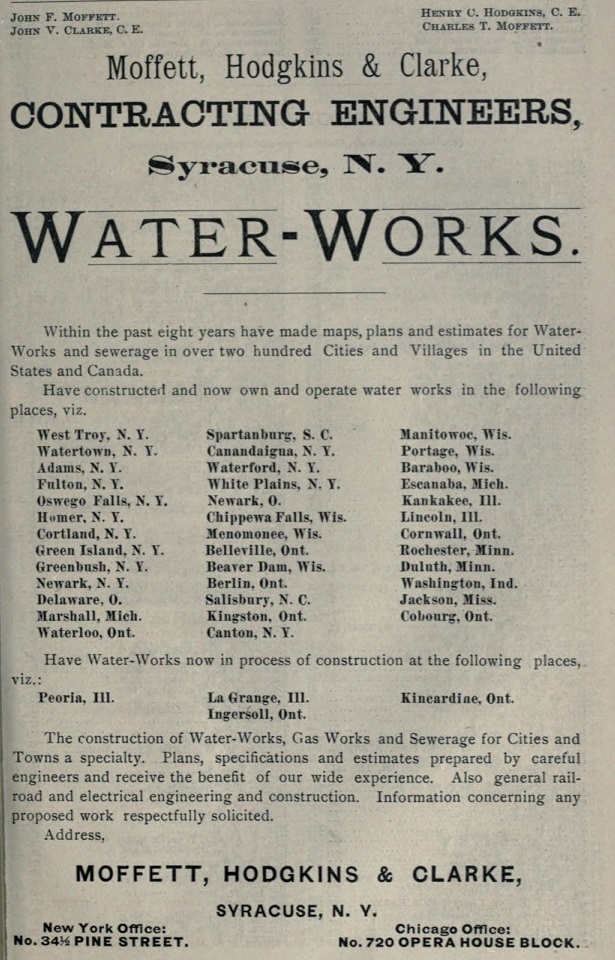 |
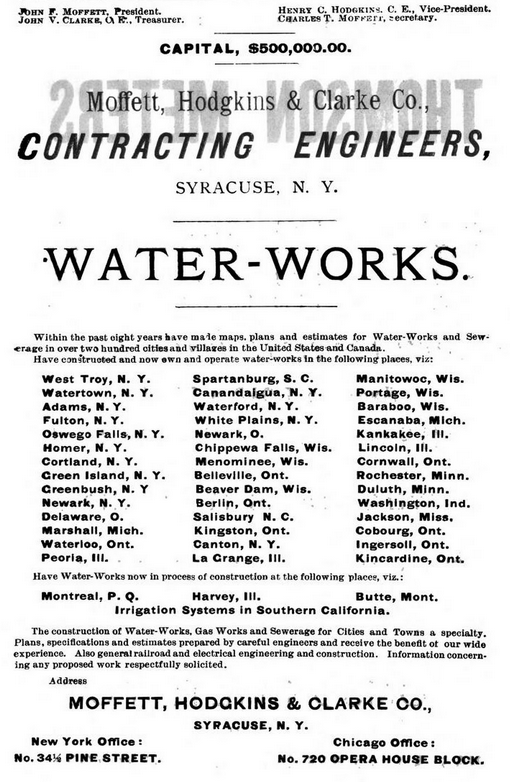 |
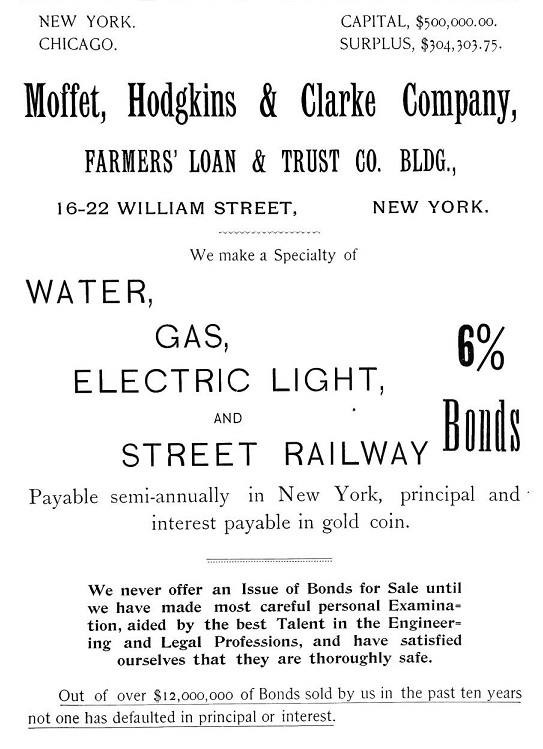 |
| Statistical
Tables from the History and Statistics of American Water Works by John James Robertson Croes (1887) Page 40. |
Manual
of American Water Works, Volume 1 (1888), Page xliii |
Manual
of American Water Works, Volume 2 (1890), Page 735 |
Manual of American Water Works, Volume 3 (1891), Page xvii | American millionaires : the Tribune's list of persons reputed to worth a million or more. (1892) Page xxxv |
The company owned 37 systems in the U.S. and another 9 in Canada:
| City |
State |
Company |
Year |
Notes |
| Watertown | NY | Cold Creek Water Co. | 1884 | Supplied water to the Remington Paper Mill |
| Canandaigua | NY | Canandaigua Water Works Co. | 1884 | |
| Cortland | NY | Cortland Water Works Co | 1884 | |
| Fulton | NY | Fulton Water Works Co | 1885 | |
| Adams | NY | Adams Water Works Co | 1885 | |
| Oswego Falls | NY | 1885 | Supplied from Fulton | |
| Baraboo | WI | Baraboo Water Works Co | 1886 | |
| Escanaba | MI | Escanaba Water Works Co | 1887 | |
| White Plains | NY | Westchester County Water Works Co. | 1885 | |
| Kankakee | IL | Kankakee Water Co. | 1887 | |
| Newark | OH | Newark Water Works Co. | 1886 | |
| Lincoln | IL | Lincoln Water Light & Power Co. | 1886 | |
| Homer | NY | Homer Water Works Co | 1886 | |
| Chippewa Falls | WI | Chippewa Falls Water Co. | 1885 | |
| Menominee | WI | Menominee Water Works Company | 1885 | |
| Duluth | MN | ? | 1888 | Bought and rebuilt existing system[?] |
| Rochester | MN | Rochester Water Works Co | 1887 | |
| Beaver Dam | WI | Beaver Dam Water Works Company | 1888 | |
| Greenbush | NY | Greenbush Water Works Company | 1887 | |
| Green Island | NY | Green Island Water Co. | 1888 | |
| Spartanburg | SC | Spartanburg Water Works Company | 1889 | |
| Portage | WI | Portage City Water Co. | 1887 | |
| Newark | NY | Newark Water Works Co. | 1888 | |
| Washington | IN | Wahington Water Works Co | 1888 | |
| Salisbury | NC | Salisbury Water Works Company | 1887 | |
| Delaware | OH | Delaware Water Co. | 1888 | |
| Marshall | MI | Marshall Water Works Co | 1889 | |
| Jackson | MS | Jackson Light, Heat & Water Co | 1889 | |
| Watervliet | NY | West Troy Water Works Co | 1888 | |
| Manitowoc | WI | Manitowoc Water Works Company | 1888 | Sold in 1896 to T.W Gray and W.G.
Maxey |
| Waterford | NY | Waterford Water Co | 1888 | |
| Canton | NY | Owned by village | 1889 | |
| Peoria | IL | Peoria Water Co. | 1891 | Bought and rebuilt existing system from City of Peoria |
| La Grange | IL | La Grange Light and Water Works Co | 1890 | |
| Harvey | IL | Harvey Transit Co. | 1892 | |
| Butte | MT | Butte City Water Works Co | 1892 | |
| Rhinelander | WI | Rhinelander Water Corks Co | 1892 |
The newly-incorporated company decided to go into the electric light plant and railroad construction business, and also pursued irrigation projects in California. The company was forced into receivership during the financial downturn on August 30, 1893 and the subsidiary companies were sold off. John V. Clarke ended up owning the Westchester County Water Works Company in White Plains before it was seized by the city of White Plains on September 1, 1898.
In 1889 Hines formed a copartnership with Mr. E. A. Bond for the construction of water works and general engineering, and under their direction as engineers, water works were built in the villages of Antwerp, Theresa, Philadelphia, West Carthage and Cape Vincent, in this county, and also several water works were built under franchise in Canada. This copartnership was dissolved in 1896.
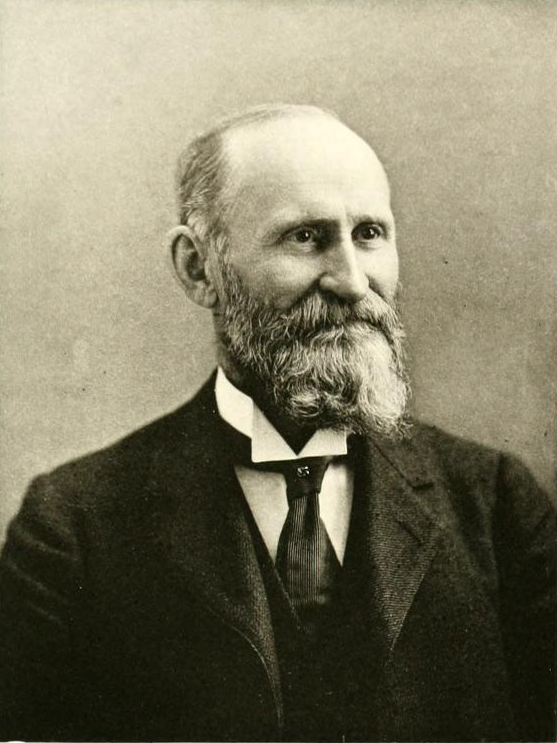 |
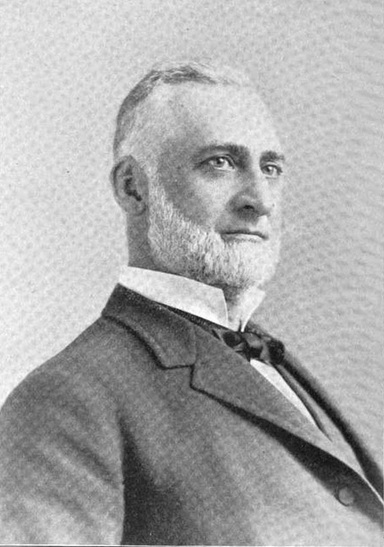 |
| Frank A. Hinds | John F. Moffett |
References
1885 "Some Figures in Water," Watertown
Daily Times, November 30, 1885, Page 4.
The Wonderful Growth of the Watertown Water Industry - How Hinds, Moffett
& Co. Have Prospered In Two Years.
In January, 1883, the contracting and civil engineering firm of F. A.
Hinds & Co. was reorganized, and the following gentlemen began
business under the names of Hinds, Moffett & Co.: Frank A,
Hinds, John F. Moffett, H.C. Hodgkins and J.V. Clark.
1886 "About Italian
Labor," The
Evening Herald (Syracuse, New York), January 15, 1886, Page 1.
Employed of Water Works at Cortland and Elsewhere. Hinds, Moffet
& Company's agent Sayd that "They prefer Italians to Irishmen, because
the Italians don't get drunk."
1886 "What is Found," The
Evening Herald (Syracuse, New York), February 4, 1886, Page 1.
The Real Inwardness of the "New Water Company." Its Pretensions
Investigated. A New York Syndicate in Syracuse and a Syracuse
Syndicate in New York. But on Hinds, Moffett & Co.
1886 "An Attack on Hinds, Moffett & Co.," Newark Union, February 13, 1886, Page 4.
1886 The
Catskill Recorder, March 19, 1886, Page 3.
John C. Lockwood of New York makes what seems to be substantially the same
proposition to Seneca Falls in reference to the building of waterworks
that be made to CatskilL The Board of Trustees of that village held a
special meeting and granted Mr. Lockwood for six months the exclusive
privilege to prepare and report plans, and revoked tho rights granted some
time ago to Messrs. Hinds, Moffett & Co, of Watertown.
1886 "Notice of
Disolution," Watertown
Daily Times, April 1, 1886, Page 1.
April 1st, 1886. The firm of Hinds, Moffett & Co. is this day
dissolved by mutual consent, Mr. Frank A. Hinds retiring. The
business of engineering and contracting heretofore carried on by the above
firm will be continued by the undersigned under the firm name of Moffett,
Hodgkins & Clarke. All contracts heretofore entered into by the
firm of Hints, Moffett & Co. will be faithfully executed and carried
out by the new firm. John C. Moffett, Henry C. Hodgkins, John V.
Clarke.
1886 "A New Firm," Watertown
Times, April 1, 1886, Page 4.
By reference to our advertising columns it will be observed that a change
has taken place in the personnel of one of our leading business
firms. Messrs. Hinds, Moffett & Co. have dissolved their
partnership, and a new firm haa been formed for the purpose of continuing
the business of engineering and contracting.
Mr. Frank A. Hinds retires from the firm, leaving the old partners,
Messrs. John F. Moffett, Henry C. Hodgkins, and John V. Clarke, who will
continue the business under the style of Moffett, Hodgkins A. Clarke.
Mr. Hinds states that the principal reason for his retirement from the
business is on account of impaired health. That the magnitude of the
firm's combined operations has been such as to require his utmost efforts
for several years past, and that the constant strain has severely taxed
his health and strength, and he considers it his duty to give himself a
respite. Much of the success of the late firm is doubtless due to the
wisdom manifested by Mr. Hinds, and the firm Inform us that they regret
Mr. Hinds' inability to remain in tho active management of the business.
He will, however, as occasion requires, act as consulting, engineer for
the new firm, and while not actively engaged ln business will devote
himself to pursuits congenial to his tastes and profession.
The new firm have contracts already made for building water-works in
several cities in this state and tn the west, and are about to conclude
several others, so that in their line, at least, there seems to be no lack
of business. We are of the opinion, however, that so far as the
business of the firm is concerned, the reason why they have so much to do
is because they are competent and well qualified to perform what they
undertake, are thoroughly reliable, and have made a success of every water
works enterprise they have taken hold of.
The firm have in their employ some of the bast hydraulic and mechanical
engineers in the country, and by reason of their superior ability and the
care and attention given to the business, they have established a very
high reputation all over the country as water works experts and
builders. The Times wishes the new firm continued prosperity.
1886 Watertown
Re-Union. April 7, 1886, Page 4.
Messrs. Hinds, Moffett & Co. have dissolved their partnership, and a
new firm has been formed for the purpose of continuing the business of
engineering and contracting. Mr. Frank A. Hinds retires from the firm,
leaving the old partners, Messrs. John F. Moffett Henry C. Hodgkins, and
John V. Clark, who will continue the business under the style of Moffett,
Hodgkins & Clarke.
1886 "The Fulton Water Works Scheme," The Evening Herald (Syracuse, New York), April 25, 1886, Page 5.
1886 Democrat
and Chronicle (Rochester, New York) June 17, 1886, Page 3.
Messrs. Pecke and Kellogg, civil engineers, representing the Moffett,
Hodgkins & Clarke water-works conractors, (late Hinds Moffett &
Co., Mr. Hinds having withdrawn on account of ill-health) are spending a
little time in Newark looking up the question of water-supply for that
village and hoping to pick up the dropped thread, and work it to a
successful issue, in some way.)
1886 Annual
report of the mayor and officers of the city of Raleigh, for the
fiscal year ending April 30, 1887.
Pages 111-156: Report of Water-Works Committee
Page 123: List of bidders, August 9, 1886, including Moffitt,
Hodgkins & Clark.
1888 An Ordinance Providing for the Supply of Water for the City of Delaware, Ohio. October 4, 1888. Also includes Rules and Regulations of the Delaware Water Company.
1891 Moffett, Hodgkins & Clarke Company incorporated in New Jersey, March 3, 1891, capital stock $500,000. Dissolved 1896.
1893 The
Boston Stock Exchange: With Brief Sketches of Prominent Brokers,
Bankers, Banks and Moneyed Institutions of Boston, by Clarence
Walker Barron
Moffett, Hodgkins & Clarke Company, Farmers' Loan and Trust Company
Building, 16 William Street, New York
Increased wealth in the United States has reduced interest rates until at
present long-time investments at 6 per cent are rare. There is no better
investment than a waterworks bond under proper conditions.
The plant must be well built, the water pure and wholesome, and the supply
abundant. The bonded indebtedness must not be excessive, and the bonds
must be issued in compliance with law. With these conditions and good
management, a waterworks plant in a growing place is a basis of
unquestionable security.
Moffett, Hodgkins & Clarke Company of New York make a specialty of 6
per cent waterworks bonds. They have constructed some 65 waterworks
systems in the United States and Canada, and have sold more waterworks
bonds than any other house in this country. This company has never sold a
bond that has defaulted in principal or interest.
This good record is due to the fact that they invariably insist upon
having the above conditions fully complied with; and, further, to their
careful supervision of each plant until it is firmly established. The
bonds they offer are payable in gold.
This house was organized in 1883, at Watertown, N.Y., as Hinds, Moffett
& Company. In 1886 the firm was changed to Moffett, Hodgkins &
Clarke. They removed to Syracuse, N.Y., in 1889, and in June, 1891, the
Moffett, Hodgkins & Clarke Company was incorporated, with a capital of
$500,000. On June 1, 1892, the end of their fiscal year, their surplus was
$304,000.
In September, 1892, they removed their offices to New York, where they are
now located in the Farmers' Loan & Trust Company Building, 16 William
Street.
The officers are: J. F. Moffett, President; H. C. Hodgkins,
Vice-President; J. V. Clarke, Treasurer; and C. T. Moffett, Secretary.
1893 "Goes
into the Hands of a Receiver," Chicago Tribune, August 31,
1893, Page 3.
Morris, Hodgkins & Clarke Company are pressed by small creditors.
1893 "To
Pay Creditors in Full," The New York Times, September 6,
1893, Page 5.
New-Jersey Receiver for he Moffett, Hodgkins & Clarke Company.
1894 The Growth of a
Century: as Illustrated in the History of Jefferson County, New York,
from 1793 to 1894, by John A. Haddock
Pages
224-225: John F. Moffett was born in Paris Hill, Oneida
county, on the 15th day of April, 1841. His parents, Charles D. and Emily
H. Moffett, moved to Rodman in the spring of 1845. There he attended
school until he was 17 years of age, and after that he put in two years at
the old Jefferson County Institute.
In September, 1860. he obtained a situation in the Watertown Bank and Loan
Company, of which Hon. George C. Sherman was President, and Charles
Strang, Cashier. He remained in this bank until 1865, when he was for a
short time in the employ of Wooster Sherman's bank. In 1866 he was elected
cashier of the Merchants' Bank, then a private banking institution, owned
by Hon. Norris Winslow.
He remained in this position until the Merchants' Bank was organized as a
State bank in 1870, and then continued to be identified with that
institution until 1882, when he engaged in building water works, electric
light plants and railroads in many towns and cities throughout the
country. His principal place of business is now in New York city, but his
residence is with his family at 32 Sterling street, Watertown.
Mr. Moffett's career has been eventful and interesting. His mind is broad
and not readily confined to petty details, though his education and
rearing gave him a full knowledge of business both in trade and banking.
Large enterprises, even though attended with some risks, are congenial to
his mind. His comprehensions are acute and critical, analyzing in an hour
the details that a man of less individuality might be a day in digesting.
He is a broad man in his way of living, in his ways of thinking and in the
management of affairs. He has been an enterprising, progressive
citizen, advocating all the improvements that have built up Watertown, and
it is a source of regret that his business takes him so much away, for his
face is a pleasant one to meet, his manner eminently democratic, and by
being friendly he has made many friends. When in the Merchants' Bank, he
was ever favorably inclined to aid men who were conducting industrial
establishments, a class of people who had not, as a general thing, met
with favors at the older banks in Watertown, when it was the fashion to
require three to four endorsers upon a $50 note, when the maker owned
enough property to pay taxes on $5,000. Such limited methods, lets us
hope, have forever passed away, and a broader system appears to be
animating the breasts of financiers.
Page
282: Frank A. Hinds, civil engineer, was born in Watertown.
His parents, Earl B. and Almira (Allen) Hinds, were natives of Northern
New York. After a year in the engineering department at Yale College, he
spent a year with the engineer of New York city. On Christmas, 1867, he
was married to Miss Mary R. Thompson, of Watertown, daughter of William
Thompson of that city. In 1868 he was engaged on the early survey of the
Black River & St. Lawrence Railroad. He was chief engineer of the
Carthage, Watertown & Sackets Harbor Railroad, which position he held
to the completion of the road. Later he laid out and mapped the Thousand
Island Park of the St. Lawrence river, and the numerous summer resorts in
that locality, and also for a time had charge as engineer of the
construction of the Kingston & Pembroke Railway, of Canada. Besides
other important positions he has served as city engineer of Watertown for
several terms. He formed an association with J. F. Moffett, H. E. Hodgkins
and J. V. Clark, and under the firm name of Hinds, Moffett & Co.,
established water works in many cities and villages. In 1866 he sold his
interest to his partners, and the firm became Moffett, Hodgkins &
Clarke.
Mr. Hinds' official positions have been numerous and important. He is yet
in the prime of life and good for many years of hard work. His residence,
on a suburban farm, gives him all the enjoyments of a country life.
1898 "Water
Works Besieged," The Sun (New York, New York), September 4,
1898, Page 4.
White Plains Village Holds is Plant by Force Against a Private Water
Company.
1898 Our
County and it's people: A descriptive work on Jefferson County, New
York, edited by Edgar C. Emerson
Pages 903-906: FRANK A. HINDS, civil engineer, is a native of
Watertown, and a son of Earl B. and Almora (Allen) Hinds, both born in
northern New York. His father was a farmer of Pamelia, moving into that
town from the town of Watertown in 1845, and was a resident of Jefferson
county from his youth. Earl B. was a nephew of Corlis Hinds, the first
supervisor of the town of Watertown from 1805 to 1808. Frank A. is the
older of two sons, and his brother, Oscar E., lives in Pamelia, on one of
the farms which his father owned.
Frank A. began the study of engineering in Jefferson county, and at the
age of twenty-one went to Portland, Oregon, where he continued his studies
under the county and city surveyor of that place for two years; the next
year he passed in the engineering department of Yale College, then a year
with an engineer in New York city, whose specialty was landscape work and
drainage, and returned to Jefferson county where he was married on
Christmas Day, 1867, to Mary R. Thomson of Watertown, who, with her
parents moved to Watertown from Houseyule, Lewis county, about ten years
before.
During the year 1868 Mr. Hinds was engaged in the early surveys of the
Black River and St. Lawrence Railroad (now the Carthage and Adirondack)
under Mr. Octave Blanc as chief engineer. After completing the preliminary
surveys of this road Mr. Hinds was made chief engineer of the Carthage,
Watertown and Sackets Harbor Railroad, which position he held to the
completion of the road. Later he laid out and mapped the Thousand Island
Park, Westminster Park, Round Island, Central Park and numerous others of
the great summer resorts of the St. Lawrence River. He had charge as
engineer of the construction of the Kingston and Pembroke Railway in
Canada, and after that was placed in charge of the surveys of the New York
and Boston Inland Railway, serving this latter corporation for two years.
He was city engineer of Watertown for a number of terms, and made the
survey for the city boundary when it was first incorporated.
His next operations were building and operating water works for supplying
cities and towns. He formed an association with J. F. Moffett and later
took H. C. Hodgkins and J. V. Clarke, under the firm name of Hinds,
Moffett & Co., and established water works in a number of cities and
villages in the United States. In 1888 Mr. Hinds sold his entire interest
in the business to his partners and his connection with the firm then
ceased and the firm became Moffett, Hodgkins & Clarke. In 1887 and
1888 the organization and construction of the Ontario Paper Mills near
Brownville occupied his attention, and he is at present a director in that
Company; he is also vice-president of the Board of Water Commissioners of
the city of Watertown, which position he has held for the past ten years,
having served on the Board of Water Corn. missioners since 1880; he has
also been one of the vestrymen of Trinity church, Watertown, N. Y., since
1887.
In 1889 he formed a copartnership with Mr. E. A. Bond for the construction
of water works and general engineering, and under their direction as
engineers, water works were built in the villages of Antwerp, Theresa,
Philadelphia, West Carthage and Cape Vincent, in this county, and also
several water works were built under franchise in Canada. This
copartnership was dissolved in 1896 and Mr. Hinds has since been engaged
in general hydraulic and mechanical engineering, principally among the
various mills and water powers of the Black River valley.
In business Frank A. has always taken a deep interest in the young men of
his employment, and has been generally successful in encouraging habits of
usefulness in their profession, himself furnishing an example of temperate
personal habits. There are a number of successful business men, engineers,
contractors, &c., now about the country, who commenced their career in
his office, and who look back with pleasure to their early experience.
He has resided for more than twenty-five years on a suburban farm located
at No. 101 State street in the city of Watertown, about one and a half
miles from the public square, where, with a competent man to attend to the
work, he enjoys the quiet of country life and the opportunities for study
and investigation thereby afforded.
1899 History
and genealogy of the Hinds family, by Albert Henry Hinds
Pages 239-240: Franklin Allen Hinds
1900 Moffett, Hodgkins & Clarke Co. v. Rochester, 178 U.S. 373, May 21, 1900, U.S. Supreme Court
1901 Lillian
Traver Carr, Respondent, v. The National Bank and Loan Company of
Watertown, Appellant, 167 NY 375, June 4, 1901. Court of
Appeals of the State of New York
Case involved sale of second mortgage bonds of the Westchester County
Water Works Company, The Baraboo Water Works Company, the Lincoln Light
and Power Company, and the Washington Water Company.
1901 The National Bank and Loan Company of Watertown, New York, Plaintiff in Error, vs. Lillian Traver Carr, Transcript of Record, Supreme Court of the United States, filed September 16, 1901.
1903 National Bank and Loan Company v. Carr, 189 U.S. 426, March 9, 1903, U.S. Supreme Court
1904 "John V. Clarke Dead," New York Tribune, June 10. 1904, Page 6.
1904 "John V. Clarke," Watertown
Re-Union, June 11, 1904, Page 1.
John V. Clarke of White Plains, formerly of this city, died at Roosevelt
hospital, New York, at 1:30 Thursday morning.
1904 John Victor Clarke (1859-1904) grave
1913 Proceedings
of the American Society of Civil Engineers 39:1767 (1913)
Franklin Allen Hinds, died August 23d, 1913.
1917 John Fletcher Moffett (1841-1917) grave
1925 Henry Clarence Hodgkins (1854-1925) grave
1929 Edward Austin Bond (1849-1929) Wikipedia page
© 2019 Morris A. Pierce